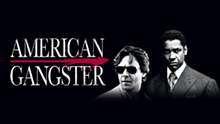 I was flicking around the streaming services last night and came across a movie called American Gangster.
I was flicking around the streaming services last night and came across a movie called American Gangster.
Released in 2007, it stars Denzel Washington as a 1970s drug boss and Russell Crowe as the cop who nails him.
That sounded interesting enough. I started watching and found it engaging enough to stay up much too late to watch it all the way through.
I ducked out to the kitchen at the start and missed the opening credits, so the first thing I saw was Denzel Washington set fire to a man tied to a chair and shoot him while Clarence Williams III stood by. OK.
It wasn’t until the end credits I saw it was directed by Ridley Scott from a script by Steven Zaillian, and produced by Brian Grazer – a pretty impressive pedigree.
It turns out it was based on a true story covered in a New York magazine article from 2000. The movie development passed through various hands with different cast and crew attached.
Washington plays Frank Lucas, who worked out he could import heroin direct with assistance from US military personnel during the Vietnam War. He thereby ends up above the Mafia and ends up supplying them as well through his own network of family members. This is part of what makes the story: the combination of Americans being in south east Asia because of the war, the relatively new ease of international travel (Lucas flies to Vietnam himself to set things up), the disorganised nature of gang crime in New York and the willingness of police to corrupt themselves for profit.
Except, that is, for Crowe’s character, Richie Roberts, who gets himself a bad name because he and his partner took almost a million dollars in crime cash and turned it in rather than keeping it for themselves. The partner is a junkie and soon overdoses on Blue Magic, the heroin distributed by Lucas (who shows himself to be very aware of the power of branding, even with – or especially with – illicit drugs). Being so unpopular in the police department, the only thing they can do with Roberts is give him a special unit to try to catch drug suppliers.
What makes the story so gripping is that Lucas is highly intelligent, singularly focused, and brutal, as well as committed to his family. He’s fine with killing people, paying off cops and making deals with other gangsters in order to fund a lifestyle for his family that lifts them out of the gutter and into palatial houses. Roberts, on the other hand, is a pariah to his workmates and bosses, is unfaithful to his wife – who is divorcing him – and is not at all sure he shouldn’t have kept the money in the first place.
The way it’s filmed is very reminiscent of 70s crime flicks like Serpico and The French Connection, just more brutal (remember when Gene Hackman’s constant swearing was a point of contention?), and it really looks like it was filmed then. The soundtrack also contributes strongly to the 70s feel. It features a host of interesting actors in supporting roles: Cuba Gooding Jr, Joe Morton, Idris Elba, Josh Brolin, Armand Assante, Ted Levine (I can only ever think him as Buffalo Bill in The Silence of the Lambs), and some rappers to appeal to “the kids”.
I’ve read that the real people it’s all based on pretty much agreed that very little of it actually happened, or at least in the way it’s depicted. Which sets up another level of moral ambiguity to go with the questions of morals and ethics depicted.
Washington is very good as a man who starts out being entirely sure of the morality of what he’s doing, triggered by the despair of his mentor and gangster boss at the state of the modern world (the aforementioned Clarence Williams III), who dies of a heart attack in one of the soulless shopping centres he so despises. Lucas is loving with his wife and his mother (Ruby Dee was nominated for a Best Supporting Actress Oscar) until he loses his way in the maelstrom of serious crime that is by no means victimless, his sense of determination turning into arrogance.
Crowe is very Russell. Overall, he does a good job with a character deliberately designed to be much more conflicted and less appealing than the bad guy. Roberts follows the opposite path to Lucas, becoming a better person as the movie goes on. Together they reach a point where choices must be made based more on their moral viewpoints and personal convictions than the law. The near final negotiation scene between them is a great verbal exploration of what’s right and what’s wrong.
American Gangster is very much a story of the time in which it’s set – would any of this have happened without the Vietnam War? – while it also flags a lot of what’s wrong with America today. Personally, I could watch Washington and Crowe all day – that’s what drew me to the movie in the first place, and this is a very good vehicle for them, as well as a cracking morality tale.